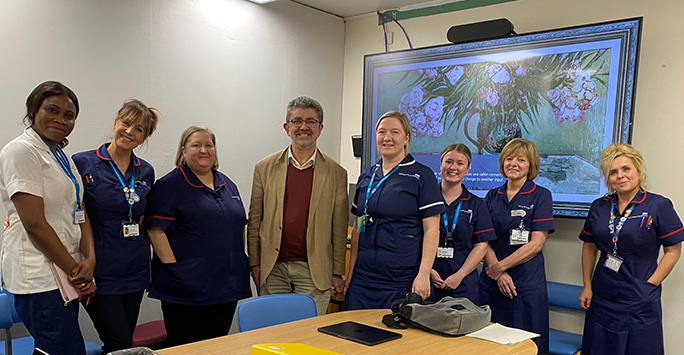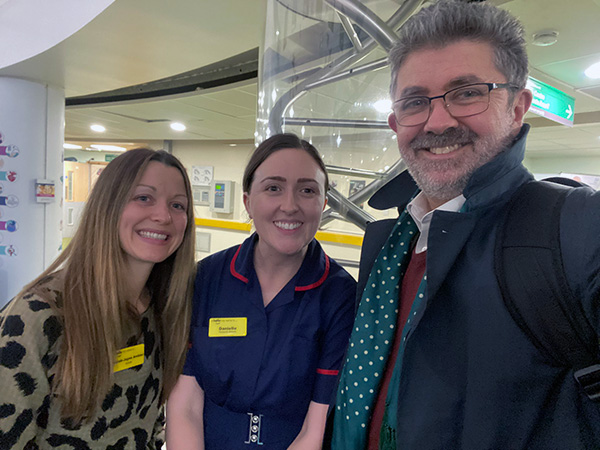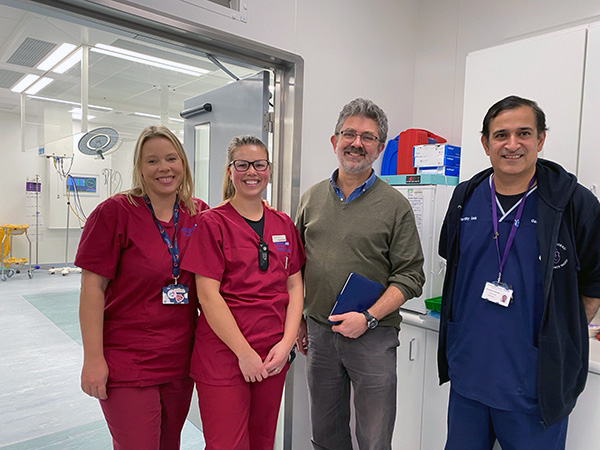
Professor Andrew Weeks, of the ILCaMS Department of Women’s and Children’s Health and specialist in international maternal health, has been on a UK wide journey to visit the sites enrolled in the potentially life-saving COPE Study.
The study, led by Professor Weeks, is already well underway with the team looking to devise better drug delivery for women with postpartum haemorrhage (PPH). COPE compares two common treatments that are used when women first start bleeding – Oxytocin and Carboprost, and explores which of them gives the best outcomes. PPH is an extremely serious condition, responsible for a death every 7 minutes worldwide (around 70,000 deaths per year). The difficulty in gaining consent from women who are actively bleeding after childbirth has previously prevented researchers from studying it.
The study aims to recruit 2000 women; a uniquely difficult task given the emergency situation. Working with consumer groups, Liverpool Clinical Trials Centre and consent expert Prof Kerry Woolfall, the research team have developed a consent pathway and demonstrated its acceptability. As a result, recruitment numbers for the study have been impressive, and Andrew has been travelling across the UK to speak to the teams responsible for recruitment and discuss the study, provide updates, and outline the next steps.
We spoke to Andrew about his time at the recruitment sites, and what he envisions for the COPE Study:
- Can you tell us which sites you have visited?
I’ve visited 8 sites so far – maternity units in Sunderland, Gateshead, Newcastle, Birmingham, UCL, Kingston, Gillingham and Taunton. Only 7 to go! A special one for me was my first visit to Medway Maritime Hospital in North Kent where my late mother was born in 1937. Despite the long history, it’s now a modern, airy maternity unit with a dynamic research culture.
- Can you tell us why you have been visiting these sites?
When we were setting up this study, the COVID pandemic was at its peak. That meant that all the site set-up and training had to be conducted online. When we filmed the recruitment training videos, we were all in bubbles of 6 so couldn’t hire the actors that we planned. But fortunately my wife was on hand to step in and play a newly delivered woman who was haemorrhaging, taking her back to her own delivery 12 years ago! Whilst running a study in 20 sites from my desk in Liverpool is very efficient, you miss the personal touch. And so I wanted to go out and meet the research teams in person, to thank them for all their work on the study and explore ways of streamlining recruitment.

- Can you give us a brief outline of the study and why it is needed?
In trying to improve outcomes for babies, maternity care has become increasingly medicalised over the last 10 years. However, this has led to increased rates of bleeding after childbirth and this now affects about 20% of births. For women who bleed, we have always given oxytocin as the first-line management – but most women will already have received oxytocin as a preventative measure, so it makes sense to use a different medication instead. But we need the evidence to work out which is the most effective first-line drug. There are more details at www.copestudy.uk.
- Can you tell us what the next steps are in the study?
The combination of COVID and the unprecedented pressure within the maternity system right now has made this a very difficult study to conduct. Understandably, the focus has been on delivering a high quality maternity care rather than on research. But we now have 1,400 recruits of the 2,000 needed, and we expect to finish in May 2025. Our funder NIHR has been very supportive and have just granted us a costed extension to complete the study.

- Can you tell us your long term ambitions for the study and what you hope it achieves?
I act as an expert advisor to WHO on PPH and I can tell you that the results of the COPE study are eagerly expected throughout the world. Virtually all guidelines recommend oxytocin as first line – so if carboprost is more effective then it will have implications for care worldwide. In addition, our new consent pathway allows researchers to do high quality randomised trials in emergency situations just after birth, and this will open up opportunities for more studies like COPE. So the results of the study could have a major impact on maternity care worldwide and save many lives. It’s exciting to be part of it.